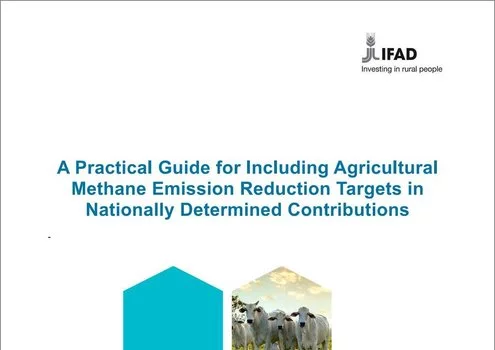KAMPALA, November 29, 2024 – As global efforts to achieve a 30 percent reduction in methane emissions by 2030 gain traction, the International Fund for Agricultural Development [IFAD] has launched a crucial guidebook to help developing countries like Uganda incorporate agricultural methane reduction strategies into their climate plans. The guide was presented during the high-level event “The NDC 3.0 Navigator: A Deeper Dive on Methane Reduction in Food Systems” at the recently concluded COP29 in Baku, Azerbaijan.
The Practical Guide for Including Agricultural Methane Emission Reduction Targets in Nationally Determined Contributions helps countries to determine and integrate targets for the reduction of their methane emissions from livestock and rice production into their updated Nationally Determined Contribution (NDC) in 2025. The guidebook provides customizable strategies for methane reduction focusing on feasible and cost-effective actions such as improved water management in rice cultivation and feed additives for livestock, which can enhance productivity and reduce methane.
“Adapting food systems to reduce methane emissions is crucial to the success of our climate efforts,” said Donal Brown, Associate Vice-President for IFAD’s Department for Country Operations. “By utilizing the step-by-step Practical Guide, developing countries have an innovative new tool to design and implement robust and targeted strategies to curb methane emissions – bringing immediate benefits.”
Since the Global Methane Pledge was launched at COP26 in Glasgow in 2021, over 150 countries have committed to reduce methane emissions from all sources by 30 per cent below 2020 levels by the end of this decade. This would reduce warming by 0.2°C by 2050. In 2021, only 36 per cent of NDCs included specified measures that address agricultural methane emissions.
The Practical Guide is part of the wider Reducing Agricultural Methane Programme [RAMP], started in 2023 by IFAD with support from the Global Methane Hub and the U.S. State Department. At the moment, RAMP provides technical assistance to 17 countries including, Argentina, Bangladesh, Brazil, Central African Republic, Dominican Republic, Honduras, Ivory Coast, Kenya, Kyrgyzstan, Mexico, Mongolia, Rwanda, Sierra Leone, Tanzania, Tajikistan, Uganda and Uzbekistan, to help them integrate methane emissions reduction in their NDCs.
Under RAMP, IFAD is also set to design 10 specific projects focused on reducing methane emissions in agriculture, particularly in rice cultivation and livestock, in at least 15 countries which so far include Bangladesh, Brazil, Cambodia, Indonesia, Kenya, Mexico, Mongolia, Rwanda, Tajikistan, Tanzania and Uganda.
The programme is expected to leverage up to US$900 million from IFAD and other sources and will be reaching more than three million small-holder farmers and rural people.
IFAD has also facilitated the creation of the Reducing Agrifood Systems Methane Emissions Informal Coordination Group with 13 other partners, including international organizations and coalitions, and national authorities. The goal of the group is to share knowledge and collaborate for global agricultural methane reduction efforts. During the same event at COP29, the group will launch a joint publication “Walking the Walk: Reducing Methane Emissions from Agrifood Systems,” presenting case studies and success in tackling methane emissions.
Investing in reduction of methane emissions is a win-win in limiting global temperature increases to less than 2.0 degrees Celsius, the goal set by 196 countries signing the Paris Agreement in 2015. Methane emissions are the second-largest contributor to global warming after C02, and methods to reduce them are well understood. Approximately 42 per cent of methane emissions come from the agriculture sector, primarily originating from livestock through enteric fermentation and manure management, flooded rice cultivation and the burning of crop residues.
Although small-scale farmers emit far less emissions than large-scale and industrial farms, they can still contribute to mitigation efforts. With the right support, they can adopt methods to reduce methane emissions while safeguarding their incomes and livelihoods.
The Reducing Agrifood Systems Methane Emissions Informal Coordination Group brings together the Climate and Clean Air Coalition, the Environmental Defense Fund, the European Commission, the Food and Agriculture Organization, the German Agency for International Cooperation, and the Global Methane Hub.
Others are the International Fund for Agricultural Development, the NDC Partnership, The Nature Conservancy, the UK Foreign, Commonwealth and Development office, the U.S. Agency for International Development, the U.S State Department, the World Bank, and the World Biogas Association.
Buy your copy of thecooperator magazine from one of our country-wide vending points or an e-copy on emag.thecooperator.news
